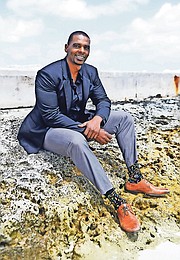Health coach Ethan Quant, of Elite Wellness Solutions, has succeeded in his weight loss journey and now wants to share his methods with the Bahamas in an effort to foster a culture of wellness and conquer the obesity epidemic.
In my previous two articles I talked about what stress was and how to notice if you are stressed. In this article I will share with you some healthy coping mechanisms you can use to help you deal with the stresses of life.
I know first-hand just how destructive negative coping mechanisms or stress can be. I was horrible at coping with stress. My go-to was alcohol and smokes. The reality is that even well in to my body transformation and losing 110 pounds I still struggled with the mental and emotional stresses of life and used smoking and alcohol as a way to numb the pressures.
Naturally this was in the grand scheme of things counterproductive. Realising this I made the made the connection between my mental and emotional state and my destructive coping mechanisms. I took the same approach that I took with my physical health: I started small. One of the first things was for me to recognise the triggers that would lead me to stress drink and smoke. The next step was to then find healthier ways of coping. Trust me, this was easier said than done.
It’s taken time and consistent practice to replace the bad with the good and even now I still “coach” myself through extremely stressful situations so that I don’t relapse.
Below are some of the positive coping mechanisms I developed to help me deal with the everyday and extreme stresses of my life. Now I would be the first to say that I am not a mental health professional and this is not an end all, be all list. However, these are techniques that I learned and applied to my personal circumstances.
If you have overwhelmed with stress and are struggling with coping, my advice is that you see a professional who specialises in mental and emotional health. With that said, here is my list:
• Change in mindset
Life happens for me and not to me. This was a huge one. Changing my perception of what’s happening around me was a big step in coping. Having the mindset that though you may not control the circumstances, you can control how you react. Looking at each situation, good or bad, as an opportunity to learn and become better. This is still something that I practice, and though it comes easier than when I started, sometimes I still have to remind myself that life happens for me and not to me.
• Have a plan
People who know me know that I am a planner. I plan every day and I know what I am going to do, how I am going to do it, and how long it’s going to take. I am not a fan of surprises and I am a firm believer in controlling what I can control. Great evidence of this is when I travel; I try to leave nothing to chance. This placing emphasis on planning really does relieve a lot of stress, because in the event that something unexpected happens I can make adjustments and deviate where I need to, but at the end of the day I at least have a plan to deviate from.
• Lift to release
This is, I think, my most tangible coping mechanism and it was born out of my love for weight training. It’s kind of funny because I used the same tools that transformed my body to get me mentally and emotionally fit. When I am stressed now I go to the gym and I lift heavy and train hard. That is a great feeling because by the end of it the aggression and frustration is released and I am doing something that’s good for my body as opposed to bad for it. And a funny thing, it also gives me clarity of thought. And sometimes that’s all we need to get through a stressful situation. I highly recommend exercise as a stress reliever.
• Talk to someone
Now, when I say talk to someone I don’t mean just any random person, and honestly sometimes it is hard to talk to family and friends, because let’s face it, everyone is dealing with their own stuff. When I say talk to someone I mean a mental health professional. Someone who is trained and has the right credentials. I know this is a touchy subject because it’s so taboo in our society, but I have a mental health professional that I call on whenever I feel overwhelmed by my own thoughts and emotions. I can truly say that he has helped me through many situations where I felt lost. Over time I have found it easier to reach out to him and book an appointment because I know just how important it is to seek the help of a professional. Just like how we go to a doctor when we are sick or get a trainer when we want to get in shape, we should have someone we can call on when we are not well mentally or emotionally. I know it’s hard, but you don’t have to do it on your own. So please, if you are struggling mentally or emotionally reach out to someone who is trained to help.
Remember if you need help navigating this or any part of your health, wellness and fitness journey, please feel free to reach out to me directly.
• You can contact Ethan Quant at ethan@elite-wellnesssolutions.com or on Instagram at @ethanquant.





Comments
Use the comment form below to begin a discussion about this content.
Sign in to comment
Or login with:
OpenID